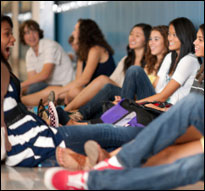Students identifying as lesbian, gay, bisexual or transgender are at increased risk for absenteeism and a lower grade point average due to harassment and safety concerns in school, according to the 2009 National School Climate Survey. While many researchers have examined the psychological effects of bullying and harassment, it is also important to understand the impact of victimization on self-esteem, school attendance and education outcomes.
A 2012 study from New York University published in the Journal of School Violence, “The Effect of Negative School Climate on Academic Outcomes for LGBT Youth and the Role of In-School Supports,” analyzes survey data relating to a sample of 5,730 LGBT students between the ages of 13 and 21 who had attended secondary schools in the United States.
Study participants were asked about the frequency of verbal harassment, physical harassment and physical assault at school during the past academic year as well as school attendance, academic achievement, self-esteem and their degree of “outness” at home and school. They also reported whether or not their school had a gay-straight alliance, anti-harassment policies, an inclusive curriculum, and other supportive structures.
The study’s findings include:
- In-school victimization predicted decreased self-esteem and worse educational outcomes, specifically a lower GPA and increased absences. Self-esteem was positively associated with GPA and negatively associated with missed school. Therefore, in-school victimization is both directly and indirectly related to diminished educational outcomes.
- The presence of a gay-straight alliance was related to fewer incidences of victimization but not an individual’s self-esteem or educational outcomes.
- The presence of a curriculum that included positive representations of LGBT people, history and events was associated with significantly less in-school victimization and higher GPAs for LGBT students. However, such curriculum was not a significant predictor of self-esteem or absences.
- An anti-LGBT harassment policy in school was associated with increased self-esteem.
- The strongest predictor for positive outcomes for LGBT students was supportive educators. “Students who reported having more supportive educators were likelier to report higher GPAs and less likely to have missed school. Further, supportive staff might be especially helpful for students who are highly victimized, given the significant interaction between victimization and educators for missing school.”
The authors suggest that further research be conducted on the ways in which educators make a difference for LGBT students. “Such research would also help inform pre-service and continuing education for school staff on how to help create a safe and affirming school environment for these students.”
In related research, a 2012 report from Harvard’s Berkman Center for Internet & Society, “Bullying in a Networked Era: A Literature Review,” examines and consolidates the research findings of studies published between 2008 and 2012 and analyzes online dynamics in this area.
Tags: bullying, youth, children, gay issues, teachers


Expert Commentary